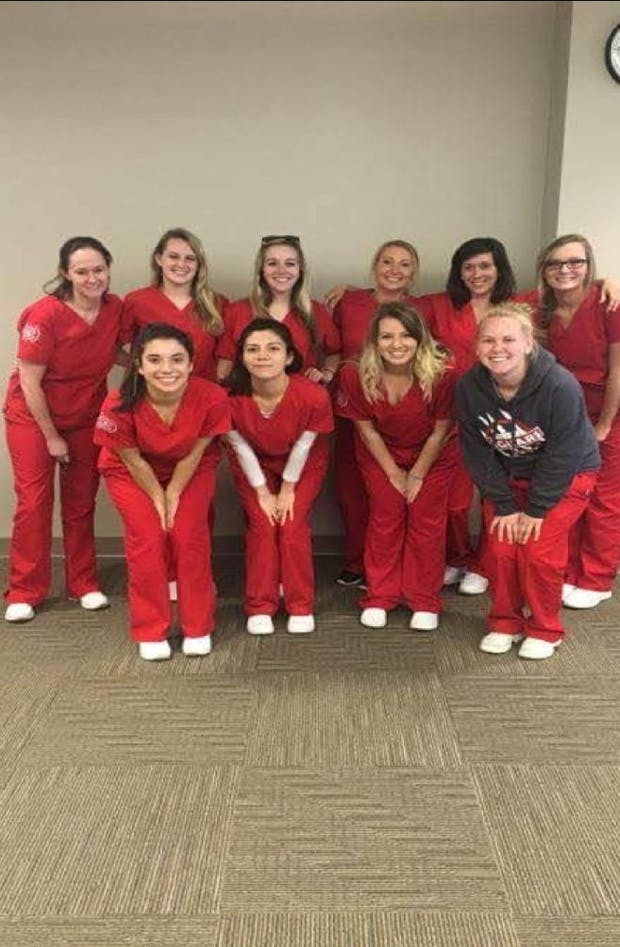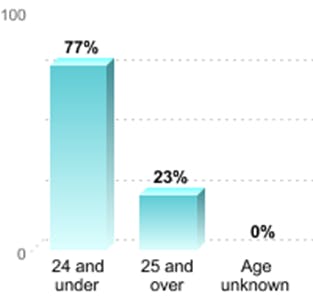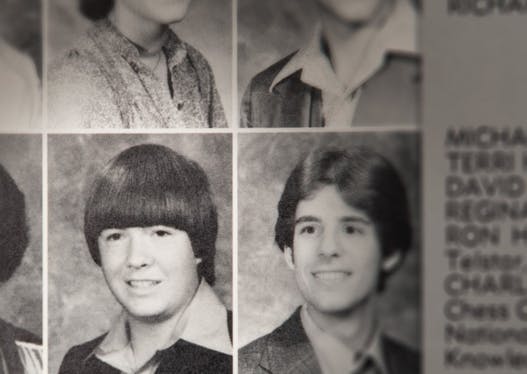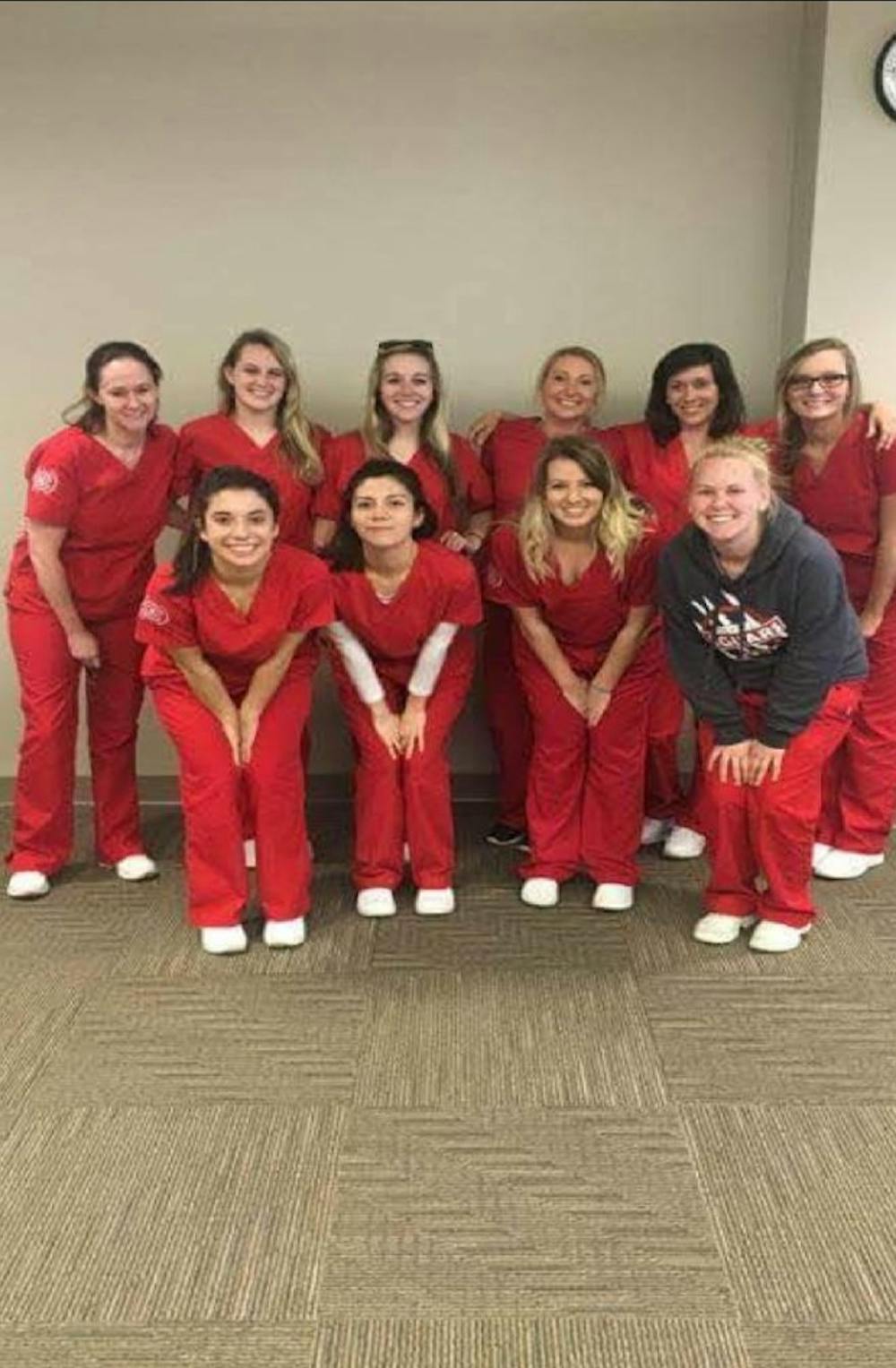Samantha Johnson remembers the moment she decided to return clearly. It was three years ago, in January, just a few days after her son’s first birthday. The Alabama native, whose slight Southern accent peaks through every other syllable, smiles wide when recalling the chain of events that led her to IUPUI’s nationally ranked Nursing School.

Johnson
“It’s funny how life just times out,” Samantha said.
Samantha, who goes by Sam, was 25 and waiting tables full-time at Kona Grill, an upscale Japanese-American fusion restaurant in Carmel. She gave up holidays with her family and son, picked up extra shifts and often worked grueling 12-hour doubles. But still she struggled to support her family- even with the help of her partner, Jonny.
However, in the final weeks of 2014, things began to change. Jonny landed a new job with better salary, a friend of Sam’s opened a day care, and then, out of nowhere, she got the email.
“It was a split-second decision,” Sam said, “I got an email from IUPUI for whatever reason… and it was like an Omen.”
The email was informing her about the upcoming semester. This was her second chance. Jonny’s job allowed her to work less. Elliot had a day care. It was time. She applied the next day, and got in. The 28-year-old will complete her nursing degree after the Fall 2018 semester, “in 367 days”.

(Retrieved from NCES sit at https://nces.ed.gov/collegenavigator/?s=IN&ct=1&id=151111)
“I always wanted to go back to school,” Sam said. “Even after failing out of Alabama and (attending) two community colleges, I wanted to go back to school because I knew I had to.”
Students over the age of 25, like Sam, are often referred to as non-traditional or adult students, and make up around 23 percent of IUPUI’s undergraduate population, according to the National Center for Education Statistics. These individuals account for over 8 million students nationally, as of 2015.
Many non-traditional students have attended a university or community college. According to the Organization for Economic Co-operation and Development, only 46 percent of Americans complete college once they start. In Indiana, over 750,000 adult Hoosiers have some college, but no degree. Some students leave to support their families, others due to the financial burden and some just aren’t “into it.”
One such adult is Ronald Hanson. The 57-year-old, who goes by Ron,

first enrolled at IUPUI in 1979 and bounced between full and part-time until 1987. He returned in 1989 and again in 2002. His most recent enrollment was this past summer, when he officially became a Journalism student. In an email interview, the “38th year junior” discussed his on-again, off-again college experience.
“Back then I was a communications major,” Ron said via Email, “but in those days the program was not what I would call very robust.”
He explains that in the late ‘70s and early ‘80s it was hard for universities to keep up with the ever-evolving, and often costly video and television equipment. Ron was eager to “get on” with his life, and found himself in the center of a rapidly changing city.
Downtown Indianapolis was experiencing a building boom, the Colts had just come to town and the city hosted a multitude of major sporting events (like the Indy 500 and Pan Am Games). For a “budding photojournalist” there was ample career opportunity outside the classroom. Before he left IUPUI, Ron had been published in Sports Illustrated and most major newspapers.
“That’s why I dropped out,” Ron said, “I was getting so much work on opportunity shooting for UPI, AP (and) the Indy papers that I didn’t have time for school.”
After leaving IUPUI, Ron transitioned to TV and worked as a video editor and photographer. He moved to Pittsburgh, working in commercial production. He returned to Indianapolis in 1995. By then he had shot, edited, produced and directed for ESPN, Speed, TLC and OLN.
“Not to sound arrogant, but my work resume is probably more accomplished than most college instructors,” Ron said, “but I don’t have a degree and if you want a staff job not having one can kill you.”
Ron started his own company, Workhorse Films, in 1999. He kept busy, maybe too busy. One day he had his blood pressure checked. It was 227/122, a level considered a hypertensive emergency- putting him at serious risk for a heart attack, stroke or other complication (although he claims he “felt fine”). After that, he decided it was time to let someone else be the boss.
“That’s when I started looking for someone to work for,” Ron said. “That’s when not having a degree became an issue.”
Unfortunately for Ron and many others, life experience is often not enough. According to an article from the Pew Research Center, Millennials are the most educated generation with 34-percent having a bachelor degree or beyond. The rising number and availability of educated workers has intensified the value of higher education in the workplace.
Yet the odds of completion and employment opportunities for non-traditional students differ greatly from their traditional counterparts. In a national study on non-first-time college students, researchers with the American Council on Education found only 33.7 percent of these students completed their degree, compared to just over 54 percent of first-time students. For Sam, the pressure to succeed is palpable.
“I’m almost 30, I have a child and I work,” Sam said. “I don’t do well on a test, it’s not ‘Oh well’ because this is it. I don’t get to fail, I don’t get to redo this.”
Ron also sees the importance of higher education. Two years ago, he began teaching at an alternative school with Indianapolis Public Schools. Although he still runs his business part-time, his teaching experience was instrumental in his most recent return to IUPUI.
“I deal with kids who question the value of a post-secondary education and they look at my success without a degree. I tell them I could have gone farther and faster with one. So I want to show them the value by setting an example,” Ron said.
The value of education Ron hopes to show his students is enforced by the statistics. According to the NCES, the median earnings of young adults with a bachelor degree were 64-percent higher than those with only high school diplomas, and for Sam those figures ring true.
According to the Bureau of Labor Statistics, in 2013 the average salary of a Registered Nurse in Indiana was $58,320. The average waitress salary was $23,020. For Sam, and others like her, a degree and stable career is detrimental to providing for her family.
“Who knows what’s going to happen,” Sam said, “and so the main goal is to get a job where, regardless of anyone else in the world, I can support me and Elliot.”
Although there are no guarantees in success or employment for traditional and non-traditional students once they earn a degree, but for Sam and Ron the gamble is worth it.
Not-So-Traditional Students: A glimpse into the lives of two adult IUPUI students

Heads up! This article was imported from a previous version of The Campus Citizen. If you notice any issues, please let us know.
Picture of Samantha Johnson with fellow nursing students, provided by Samantha
Graph of student population by age of IUPUI
Picture of Ronald Hanson in his senior year of high school, provided by Ronald Hanson.




